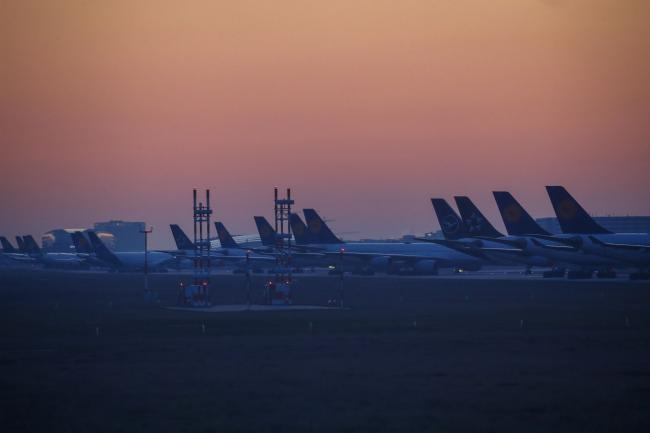This post was originally published on this site
https://d1-invdn-com.akamaized.net/content/pic5703160e8f2e4a67707e200c195a8ea7.jpg
The lifelines to the region’s two biggest carriers by passenger traffic would come after each warned of impending cash crunches and their inability to survive the effects of the coronavirus pandemic without state help. They join a global chorus of distressed airlines that have grounded fleets, furloughed staff and decried the biggest crisis ever to confront the sector.
In the case of Air France-KLM, the French and Dutch governments — the carrier’s biggest shareholders — set aside a long-simmering conflict over how the group should be run to unveil two, albeit separate, packages of direct loans and guarantees to keep it afloat.
Read more: Air France-KLM to Get State Rescue of as Much as $12 Billion
For Lufthansa, the road map to salvation is just as politically fraught, involving German Chancellor Angela Merkel and the governments of Austria, Belgium and Switzerland, where it operates so-called national flag carriers.
The willingness by France and likely Germany to shore up their ailing champions comes after the International Air Transport Association repeatedly warned the health crisis could bankrupt half the world’s airlines, with the hit to European carriers expected to reach $89 billion in lost sales. The U.K., traditionally less inclined to dole out taxpayer money, is extending loan guarantees to carriers that qualify. The U.S. is disbursing about $25 billion in payroll assistance, while airlines have also applied for government loans.
“All efforts are devoted to respond to this unprecedented shock,” French Finance Minister Bruno Le Maire and his Dutch counterpart, Wopke Hoekstra, said in a joint statement on the Air France-KLM aid package, adding that they will push the carrier to recover its competitiveness and financial footing.
Fairness Challenged
The move by France will probably serve as further ammunition to Michael O’Leary, the chief executive officer of budget carrier Ryanair Holdings Plc and the region’s most vocal opponent to state aid. He has told Europe’s top antitrust official that the airline may go to court to stop France and other countries from “selectively gifting billions of euros to their inefficient flag carriers.”
The French aid package may also spell more government intervention in the months ahead. The airline said it would consider a share issue to which the French state might participate. This raises the possibility that the direct 3 billion euro-loan extended by France could be transformed into equity, thereby raising its stake.
CEO Ben Smith has vowed to push ahead with a promised revamp, opening the door to voluntary staff departures to cut costs and a further expansion in the low-cost market.
German Debate
In Germany, Merkel’s negotiators and their counterparts at Lufthansa are expected to sit down in the coming days to hammer out a package of loans, credit guarantees and equity that could be worth around 10 billion euros, according to people familiar with the matter.
While Germany’s government negotiators have said the carrier won’t be allowed to fail, the sides have clashed over what strings will be attached to its contribution to state assistance that could total as much as 10 billion euros. Merkel’s center-left SPD coalition partners want any equity injection to come with a seat on Lufthansa’s board, whereas the company has pushed for a so-called silent participation, the people have said. Air France-KLM already has the French state on its board.“We need to find a solution which will not lead to a permanent politicization of Lufthansa,” Christian Democratic Union lawmaker Joachim Pfeiffer, who is involved in the talks, said on Friday.
State Interests
Lufthansa connects Germany to the far-flung export markets on which its world-beating factory firms depend and, like Air France-KLM, is considered too strategic to be allowed to fail. In the case of the French carrier, its service to overseas territories like Martinique, French Guiana and New Caledonia as well as domestic routes have long kept it in the sights of successive governments as strategically important.
In the U.K., where the Conservative government of Prime Minister Boris Johnson has proven to be adverse to plowing state funds directly into struggling companies, Richard Branson is fighting to save teetering Virgin Atlantic Airways Ltd.
His request for some 500 million pounds ($618 million) in U.K. funding guarantees has met with resistance, partly linked to the 69-year-old billionaire’s home in a British Virgin Islands tax haven. Low-cost EasyJet Plc has already tapped the state loan guarantee program.
Branson is considering pouring more money than he originally pledged in a bid to attract outside investors and gain access to hundreds of millions of pounds of state-backed loans, according to people familiar with the matter.
This week will also be decisive for discount regional and trans-Atlantic carrier Norwegian Air Shuttle ASA, which has already placed four units into bankrupcy protection and is pursuing a last-ditch plan to convert debt to equity. The airlne needs assent from bondholders and shareholders to fully access a 3 billion kroner ($282 million) bailout from Norway’s government.
©2020 Bloomberg L.P.


